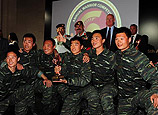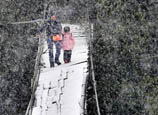
BEIJING, March 29 (Xinhua) -- At Beijing's Haite Garden Primary School, pupils pore over their work, concentrating on sums and language learning. But they are reading their study materials not in textbooks, but on the screens of tablet computers linked to a wireless broadband network.
Such scenes are currently rare in China, but may become less so after the Beijing municipal government announced on Wednesday that it will earmark three million yuan (about 482,796 U.S.dollars) to promote what is dubbed an "e-bag," turn paper books into e-books and put tablet appliances in the hands of more pupils.
Haite Garden Primary School recently became one of a handful of schools in the capital to take this plunge when it decided to restructure teaching practices using the technical breakthrough of hand-held computers.
A free tablet was issued to each child in grade one and two at the Shijingshan District school at the start of spring.
In an age when toddlers learn to use touchscreens before they can talk, tablet technology is starting to get a toe in the door of traditional classrooms.
Li Jiangnan, a teacher with the school, explains that students use the tablets in three classes -- Chinese, math and English. The technology enables vibrant interactions in classrooms.
In Li's class, students follow the teacher's guidance on drawing Chinese characters on their touchscreens. If correct, the strokes turn red, while incorrect ones remain their original color, turning the dull writing practice into a vivid online game.
Coming in the wake of the technology's surging popularity, the tablet roll-out is a trial designed to discover new ways to inspire children to learn, according to school head Wu Youying.
As a trial site, Haite Garden Primary School has encountered various teething troubles with the project -- including difficulties in network instability, shortage of e-textbook resources and limitations with charging the devices.

















 Strong wind, thunder hit Liuzhou City in S. China's Guangxi
Strong wind, thunder hit Liuzhou City in S. China's Guangxi


![]()
